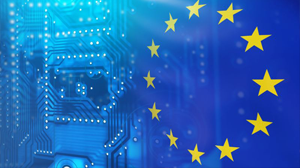| 1/31/25 |
 |
Dear [Colleague]:
This week, the dark clouds of an impending trade war were gathering in Washington, as President Trump reiterated his threats to impose both universal tariffs on all imports and even higher tariffs on certain strategic imports from China, Taiwan, Canada, and Mexico. The White House spokesperson said the president still intends to levy the tariffs starting this Saturday, February 1.
In Brussels, the European Commission published its much anticipated “Competitiveness Compass,” outlining a set of initiatives to guide the EC’s work for the next five years.
Meanwhile, the most interesting read of the week comes from Eric De Ponthaud of IPC member CSI Sud Ouest in France, who says a devastating fire at CSI’s PCB factory in Toulouse revealed “alarming” vulnerabilities in the European aerospace supply chain. Read on below and click through for a story that will sound troublingly familiar to IPC members in the U.S. and Europe.
As always, please let us know your concerns and questions. Your input and active support are crucial to the industry’s success.
Chris Mitchell
Vice President, Global Government Relations
The Headlines at a Glance:
TOP NEWS OF THE WEEK
- Will the U.S. Launch its Trade War This Weekend?
QUOTE OF THE WEEK
- Tariffs on Taiwan Could Drive Chip Production to Other Countries
UNITED STATES
- Supply Chain Issues Addressed at Hearing on Commerce Nominee
- Trump Orders Sweeping Reviews of Trade and Tech Policies
- New Study Calls Shrinkage of U.S. Electronics Sector a Security Risk
EUROPEAN UNION
- European Commission Presents “Competitiveness Compass” Plan
- Toulouse Fire Revealed Vulnerability of Europe’s PCB Sector
- EC President Foresees “Harsh” Competition, Emphasizes Competitiveness
- European Tech Sovereignty VP Officially Launches Chips Act Pilot Lines
ENVIRONMENT AND SUSTAINABILITY
- European Chemicals Agency Publishes Annual Report and Planning Document
- European Commission Finalizes Waste Management Rule
UPCOMING EVENTS
- IPC EMS Leadership Roundtable, Feb. 19-20
- IPC APEX EXPO 2025: Anaheim, California, March 15-20
HELP US SPREAD THE WORD ON SOCIAL MEDIA
KEEP IN TOUCH WITH US
 |
Is a U.S. Trade War Blitz Coming This Weekend? U.S. President Donald Trump still plans to make good on his promise to issue tariffs on China, Canada, Mexico as soon as Saturday, Reuters reports. At a retreat for congressional Republicans on Monday, Trump said he plans to impose tariffs on imports of steel, aluminum, copper, semiconductors, and pharmaceuticals in a push to “return production of these essential goods to the United States of America." Regarding the best approach to bringing semiconductor production back to the U.S., Trump said the CHIPS for America program, launched by former President Joe Biden to revive domestic production of computer chips, was “ridiculous,” USA Today reports. Trump's threat to impose tariffs of up to 100 percent on Taiwan's semiconductor industry has “sent shockwaves through the Silicon Island,” Newsweek reports. Products classified as “semiconductors and other electronic components” were the sixth largest category of goods the U.S. imported last year, valued at $126 billion. IPC will continue to monitor the issue closely, and we are prepared to express our concerns about tariffs that could distort and harm the electronics industry. IPC Contact: Chris Mitchell.
 |
 |
–Stephen Ezell of the Information Technology and Innovation Foundation, commenting on U.S. President Trump’s threat to impose new tariffs on Taiwan’s semiconductor exports
 |
Supply Chain Issues Addressed at Hearing on Commerce Nominee: The United States’ industrial base and supply chain worries were among the topics raised this week at confirmation hearings for incoming Commerce Secretary Howard Lutnick. Thanks in part to IPC advocacy efforts, Sen. Marsha Blackburn (R-TN) raised the issue, telling Lutnick, “I’ve done a good bit of work on auto manufacturing as Tennessee has become such a manufacturing center, and … on securing these supply chains for the American auto manufacturing sector. And we want to make certain that whether it's autos, appliances, equipment for data centers and computers, … or the components that are needed for high-tech assembly, we need to make certain that we straighten out the supply chain system so that we are able to repatriate US manufacturing.” Lutnick replied, “Exactly. We need to bring manufacturing and supply chain domestic … I completely agree.” IPC will continue to cultivate strong relationships in Congress and the Commerce Department to support a stronger electronics supply chain from silicon-to-systems, including PCB fabrication and PCB assembly. IPC Contact: Rich Cappetto.
Trump Orders Sweeping Reviews of Trade and Tech Policies: On his first days back in the White House last week, U.S. President Donald Trump issued a wave of executive actions that appear likely to affect electronics and other industries. Perhaps the most notable was an “America First Trade Policy,” which orders more than a dozen reviews by federal agencies of trade agreements, export control policies, the U.S.-Mexico-Canada Agreement (USMCA), and relations with China to determine their impacts on U.S. economic and national security. The memo also directs the agencies to make recommendations on tariffs and other regulatory, enforcement, and legislative actions to overcome unfair trade practices and negative impacts on U.S. national security and economic competitiveness. Altogether, the policy memorandum will kick off months of studies and subsequent actions that will lead to numerous risks and opportunities for electronics. IPC will continue to monitor and engage in the policy dialogue and keep you informed. Please let us know your questions and comments. IPC Contact: Rich Cappetto.
New Study Calls Shrinkage of U.S. Electronics Sector a Security Risk: A new study by a noted expert on semiconductors concludes “the grave deterioration of the North American electronics manufacturing base is a security risk” and must be remedied with new policies. Echoing IPC “silicon-to-systems” campaign, Chris Miller, author of the book Chip War: The Fight for the World's Most Critical Technology, writes, “Today, every defense system relies on electronic components, an increasingly large share of which can be produced only in Asia. The Chips and Science Act will partly address this problem for chips, but it exists in other segments of the supply chain too.” IPC’s seminal 2021 report on the North American electronics ecosystem is cited. Miller calls for expanding current policies beyond microchips to diversify electronics component manufacturing. The report is another sign that IPC’s call for a broader approach to U.S. industrial base security is being heard. “Like” and share this LinkedIn post by IPC’s John Mitchell if you agree. IPC Contact: Chris Mitchell.
 |
European Commission Presents “Competitiveness Compass” Plan: The European Commission this week presented its “Competitiveness Compass,” a blueprint for the EC policy process for the next five years. The document sets out an array of measures to translate three major imperatives into reality: “closing the innovation gap”; decarbonisation; and “reducing excessive dependencies and improving security.” IPC welcomes the plan’s emphasis on simplifying regulations, reducing reporting burdens, and building workforce skills as “horizontal enablers.” As concrete measures are now proposed and put into place to advance these priorities, IPC will continue to call on policymakers to integrate a comprehensive electronics manufacturing strategy into the European competitiveness strategy. IPC Contact: Alison James.
Toulouse Fire Revealed Vulnerability of Europe’s PCB Sector: A devastating fire last August at electronics manufacturer CSI Sud Ouest in Toulouse, France had “troubling implications” for Europe’s aeronautic, space, and other critical downstream industries. In an excellent essay in Euractiv, CSI CEO Eric DePonthaud says CSI was a key supplier to the French aerospace industry, and the fire revealed “alarming” vulnerabilities because the declining number of European PCB companies “cannot easily meet regional demand when major supply chain disruptions occur.” The article cites IPC’s 2024 report on Europe’s electronics industrial base, which found Europe is falling behind its global competitors in both capacity and capabilities. “If Europe is to maintain its position as a leader in global technology and secure its defence industrial base, we must prioritize policies that encourage investment in our sector,” as called for in the European electronics industry’s call-to-action. “The time for action is now before it’s too late.” IPC Contact: Alison James.
EC President Foresees “Harsh” Competition, Emphasizes Competitiveness: Speaking last week at the World Economic Forum in Davos, Switzerland, European Commission President Ursula Von der Leyen said, “The cooperative world order we imagined 25 years ago has not turned into reality,” and instead, “we have entered a new era of harsh geostrategic competition.” To cope with this shift, Von der Leyen stressed the need to boost EU competitiveness, an approach that will be further detailed in the Commission’s anticipated “Competitiveness Compass” plan. At the same time, Von der Leyen highlighted the parallel concern that in these times, the EU “wants more cooperation with all who are open for it”, including the United States, China, and India. IPC Contact: Alison James.
European Tech Sovereignty VP Officially Launches Chips Act Pilot Lines: Recently, European Commission VP Henna Virkkunen officially launched five pilot lines for state-of-the-art research and innovation in semiconductor technology, bringing a key element of the European Chips Act to fruition. At an event in Brussels, Virkkunen said the pilot lines will address five key areas: beyond 2nm leading-edge system-on-chip; fully depleted silicon-on-insulator applications; advanced packaging; wide-bandgap materials; and advanced photonic integrated circuits. The pilot lines will provide open access to state-of-the-art research facilities, aiming to strengthen Europe’s industrial competitiveness and innovation across diverse sectors. IPC Contact: Alison James.
 |
European Chemicals Agency Publishes Annual Report and Planning Document: The European Chemicals Agency (ECHA) has published its Single Programming Document for 2025 to 2027, setting out the actions, indicators, and resources to be used in regulating chemicals for the next few years. ECHA's mid-term priorities are set out in the strategic planning document, which is part of the programming document, which also includes a set of strategic reports that describe ECHA’s priority tasks, and annual reports outlining the Agency's achievements each year. IPC is still assessing the programming document and its impact on electronics. Please let us know if you have questions or concerns. IPC Contact: Diana Radovan.
European Commission Finalizes Waste Management Rule: The European Commission has published the final version of its Packaging and Packaging Waste Regulation (PPWR), which will now enter into force in 20 days and become fully applicable in 18 months. The regulation creates a legal framework for the full life cycle of packaging and includes measures to reduce the production of packaging waste, promote reuse, and encourage recycling and other forms of recovery. IPC is continuing to study the rule and its implications for electronics; we welcome your questions and comments. IPC Contact: Diana Radovan.
 |
IPC EMS Leadership Roundtable: Public Policy and Your Business (Washington, DC), Feb. 19-20: If you care about the future of the EMS sector, join us in DC to dive into key policy topics, network with industry leaders, enjoy a reception and dinner, and participate in optional meetings with policymakers to shape the future of EMS. Learn more and register here.
IPC APEX EXPO 2025 (Anaheim, California), Mar. 15-20: Discover the newest innovations and hear from the best minds in the electronics manufacturing industry. IPC APEX EXPO 2025 will be our industry’s largest event in North America, featuring a world-class trade show, professional development courses taught by industry experts, non-stop networking and more. Learn more and register here.
 |
 Europe’s electronics industrial base is shrinking, and the fire at CSI Sud Ouest is the latest warning sign. The disruption to aerospace and space industries highlights how fragile Europe’s supply chain has become. The European Commission’s Competitiveness Compass sets a vision for prosperity and growth. However, achieving this requires stronger public-private collaboration and investment in electronics manufacturing. Without action, Europe risks falling further behind in global competitiveness.
|
 If you’re interested in politics and policy and haven’t visited the IPC Advocacy pages recently, they're worth a minute of your time. Recently relaunched with an entirely new design, the page now offers immediate, top-of-the-page access to the latest IPC Advocacy news from North America, Europe, and Asia. You can also subscribe to or access recent issues of IPC's weekly Global Advocacy Report, which is packed with news you can use; and learn ways you can help make our industry’s voice heard in the halls of government. |


